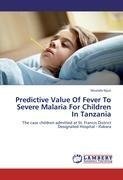
-
 Anglický jazyk
Anglický jazyk
Predictive Value Of Fever To Severe Malaria For Children In Tanzania
Autor: Mustafa Njozi
Clinicians and medical practitioners have been using the Integrated Management for Child Illness (IMCI) strategy for malaria treatment for children introduced by World Health Organization (WHO). The IMCI advocated for presumptive malaria treatment (mainly... Viac o knihe
Na objednávku
45.36 €
bežná cena: 50.40 €
O knihe
Clinicians and medical practitioners have been using the Integrated Management for Child Illness (IMCI) strategy for malaria treatment for children introduced by World Health Organization (WHO). The IMCI advocated for presumptive malaria treatment (mainly using fever and other few symptoms) to treat malaria. The IMCI strategy was suggested in areas with high malaria prevalence for the aim of reducing child mortality as the strategy was cost effective with short treatment time as compared to laboratory confirmation. Since malaria is declining and WHO has changed the strategy to the use of Rapid Diagnostic test (RDT) in malaria confirmation even though still medical practitioners treat severe malaria presumptively. The researcher find a need to see how truly fever can predict malaria. The study is using the Classification and Regression tree with step wise discriminant analysis in calculating the predictive value of fever to malaria for children diagnosed and treated for severe malaria
- Vydavateľstvo: LAP LAMBERT Academic Publishing
- Rok vydania: 2012
- Formát: Paperback
- Rozmer: 220 x 150 mm
- Jazyk: Anglický jazyk
- ISBN: 9783659272837





 Slovenský jazyk
Slovenský jazyk 





